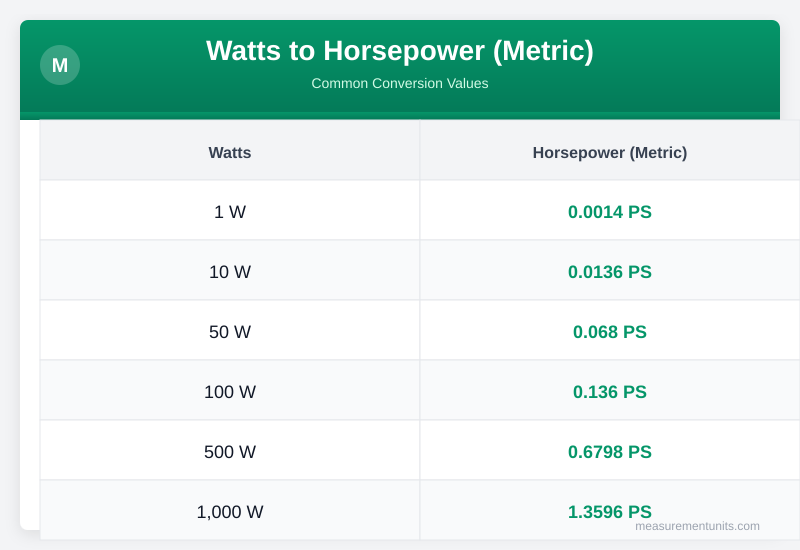Watts to Horsepower (Metric) Calculator
VerifiedConvert watts to metric horsepower accurately with our guide, exploring power measurement history, conversion methods, and practical applications
Power Calculator
Convert between different power units instantly with precise calculations
Watts to Horsepower (Metric) Conversion Table
Common Watts to Horsepower (Metric) conversion values
| Watts | Horsepower (Metric) |
|---|---|
| 1 W | 0.001 PS |
| 10 W | 0.014 PS |
| 50 W | 0.068 PS |
| 100 W | 0.136 PS |
| 500 W | 0.680 PS |
| 1000 W | 1.360 PS |
About Watts to Horsepower (Metric) Conversion
Whether for work, school, or a personal project, converting Watt to Horsepower Metric comes up more than you'd expect. Here's the quick way to do it.
The concept of measuring power dates back to the late 18th century when James Watt, a Scottish engineer, introduced the term 'horsepower' to describe the power of steam engines. Initially, one horsepower was equivalent to 33,000 foot-pounds per minute, or about 550 foot-pounds per second. However, with the advent of electrical systems, a more standardized unit of measurement was needed, leading to the definition of the watt as the base unit of power in the International System of Units (SI).
In the context of mechanical power, such as in engines or motors, horsepower is often used, whereas in electrical systems, watts are the standard. The need to convert between these units arises from the diverse applications of power measurement, ranging from calculating the efficiency of electrical motors to determining the performance of vehicles. Understanding the difference between mechanical and electrical power is crucial, as mechanical power considers the force applied and the distance over which it is applied, while electrical power is the product of voltage and current.
Engine ratings, for example, are typically given in horsepower or kilowatts, highlighting the importance of conversion. A car engine might be rated at 150 horsepower or approximately 112 kilowatts. This rating gives consumers an idea of the engine's power output and, by extension, the vehicle's performance.
The accuracy of these conversions is critical, especially in industrial settings where the miscalculation of power can lead to inefficiencies or even safety hazards.
Historically, the conversion between watts and horsepower was not as straightforward due to variations in the definition of horsepower itself. 49875 watts, conversions have become more standardized. This standardization is essential for international trade and communication among engineers and technicians from different countries.
49875 W. This factor allows for precise calculations, which are necessary in both engineering applications and everyday scenarios, such as comparing the power output of different appliances or vehicles. The significance of accurate conversions cannot be overstated, as it ensures compatibility and consistency across various systems and applications.
Conversion Methods
To convert watts to metric horsepower, one can use the conversion factor directly. 36 metric horsepower. This method provides an exact conversion and is widely used in engineering and technical applications.
Another approach involves using approximation techniques for quicker, albeit less precise, calculations. 5, the calculation becomes simpler, though slightly less accurate. This method is useful for mental math or when a quick estimate is sufficient.
Step-by-step examples are invaluable for understanding the conversion process. 8 metric horsepower. This demonstrates how to apply the conversion factor to real measurements.
Precision matters significantly in certain applications. In the design of electrical systems or the specification of industrial equipment, exact conversions are crucial to ensure that components are appropriately sized and that the system operates efficiently and safely. In contrast, approximations might suffice for casual comparisons or rough estimates.
metric horsepower). It's also important to be aware of the context in which the conversion is being applied, as different fields may have slightly different conventions or requirements for precision.
Practical Applications
In electrical systems, understanding the conversion between watts and metric horsepower is essential for designing and specifying equipment. For instance, knowing the power output of a generator in watts and converting it to metric horsepower can help in selecting appropriate mechanical components, such as gears or motors, that can handle the power output.
Automotive performance is another area where these conversions are critical. Car manufacturers often provide engine power in both horsepower and kilowatts, necessitating conversions for comparison or regulatory compliance. 1 kilowatts or 200 metric horsepower, depending on the context.
Industrial equipment, such as pumps and compressors, is often rated in terms of power consumption or output. Converting between watts and metric horsepower helps in selecting the right equipment for a specific task, ensuring that it can handle the required workload without overheating or failing prematurely.
Renewable energy systems, like wind or solar power installations, require precise power output measurements to assess their efficiency and performance. Converting the electrical power generated by these systems into metric horsepower can provide a more intuitive understanding of their capability, especially when compared to traditional fossil-fuel-based power generation methods.
Efficiency ratings of appliances and vehicles are also affected by these conversions. For instance, the efficiency of an electric motor can be expressed as the ratio of its mechanical power output (in horsepower) to its electrical power input (in watts). Accurate conversions are necessary to calculate and compare the efficiency of different models or technologies.
Watts to Horsepower (Metric) Conversion Chart
